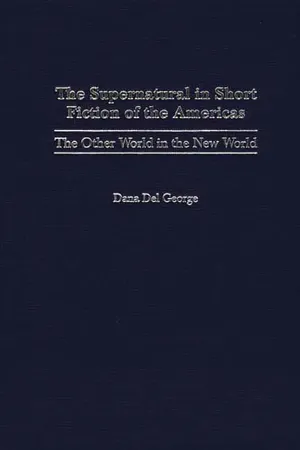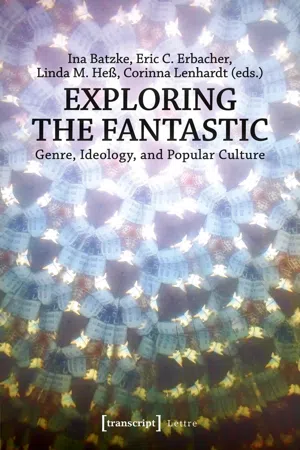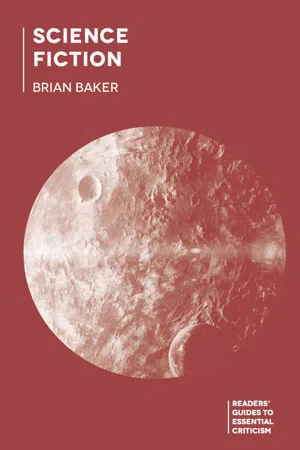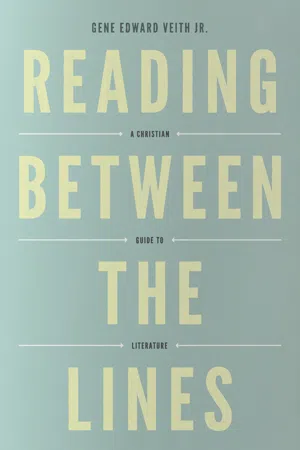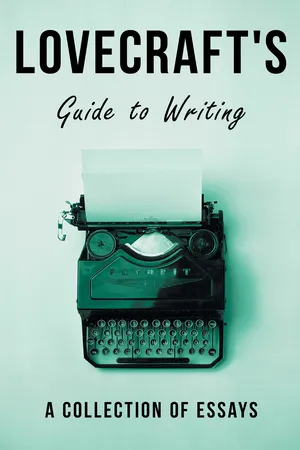Literature
Supernatural Fiction
Supernatural fiction is a genre that incorporates elements of the supernatural, such as ghosts, vampires, and magic, into its storytelling. It often explores the unknown and unexplained, blurring the lines between reality and the supernatural world. This genre has been popular in literature for centuries, captivating readers with its mysterious and otherworldly themes.
Written by Perlego with AI-assistance
Related key terms
1 of 5
5 Key excerpts on "Supernatural Fiction"
- eBook - PDF
The Supernatural in Short Fiction of the Americas
The Other World in the New World
- Dana Del George(Author)
- 2001(Publication Date)
- Praeger(Publisher)
But though the modern storyteller is unlikely to 4 THE SUPERNATURAL IN SHORT FICTION believe that the supernatural is real, her impulse to include it in a story is, as it is for her ancestors, based on a desire to make her story more meaningful. Describing fantasy, the category into which she collects the supernatural, Kathryn Hume states: Its manifestations in the text serve several purposes: relieving authorial tensions or giving voice to authorial vision; manipulating and releasing audience tensions; shocking, enchanting, and comforting. Above all, fantasy helps activate whatever it is in our minds that gives us the sense that something is meaningful. (20) So whether in premodern or modern literature, the use of the supernatural increases a story's meaning. The literary effects Hume describes—"shocking, enchanting and comforting"—have something in common with the effects of the supernatural described by Oman: manifesting "absolute value," stirring "the sense of the holy," and demanding esteem as "sacred" (Oman 72). Oman and Hume both see positive effects of the supernatural and associate it with meaningfulness. To this extent, their views are rather traditionalist and are not at great variance with premodern attitudes toward the supernatural. However, these views represent the lesser part of modern critical opinions. Most modern literary critics assign to the supernatural a negative value. This is partly because modern fantastic fiction tends to represent the supernatural as fearful, and critical descriptions of supernatural literature reflect this tendency. THE FANTASTIC: THE SUPERNATURAL THREATENS REALITY For many critics, a defining quality of the fantastic is the intent to produce fear or horror in the reader. Regarding the fantastic genre, Jaime Alazraki notes, "The distinctive characteristic of the genre, in which all the critics seem to agree, would be in its capacity to engender fear or horror" (En busca del unicornio 18, translation mine). - eBook - PDF
Exploring the Fantastic
Genre, Ideology, and Popular Culture
- Ina Batzke, Eric C. Erbacher, Linda M. Heß, Corinna Lenhardt, Ina Batzke, Eric C. Erbacher, Linda M. Heß, Corinna Lenhardt(Authors)
- 2018(Publication Date)
- transcript Verlag(Publisher)
Genre Belief, Potentiality, and the Supernatural: Mapping the Fantastic D ANIEL S COTT Genre definitions are necessarily problematic in that they attempt to impose rules and boundaries where no tangible ones exist. At the same time, we presuppose genre by default, and disproving genre is certainly as difficult, if not more so, than proving it. In talking specifically about fantasy literature, we are of course intentionally begging the genre question in itself, but it becomes inescapable once we start considering specific genre subcategories and their functions. And despite the many pitfalls that genre discussion contains, it can be rewarding to analyze the connections between the fantasy genre and certain modes of thought. Since my research deals with the intermeshing of theist and atheist thought with fantastic genres, I needed a working genre definition with which to frame the fantastic. It was here that traditional definitions of the fantastic proved to be use-ful but often ultimately inconclusive, since they could not account for varying viewpoints of the reality from which fantasy derives. This is critical because Christian speculative fiction, an example of theist fiction, shows that our concep-tions of fantasy as non-reality do not account for varying epistemic stances of re-ality, in this case, for the divergence between how atheists and theists perceive the world. I therefore set forth a broad but hopefully comprehensive definition of fanta-sy that encompasses “classic” fantasy fiction as well as works of science fiction and Christian speculative fiction. This definition, though it accepts diverging ep-istemic viewpoints and attempts to avoid bias, is based on an evaluative system that both theists and atheists must necessarily subscribe to: grammar. - eBook - PDF
- Brian Baker(Author)
- 2017(Publication Date)
- Red Globe Press(Publisher)
The Marvellous, which includes SF, involves a supernatural explanation for elements of strangeness; the Uncanny is ultimately resolved through a natural explanation; in the Fantastic, there is a hesitation between the two, and the provenance of strange phenomena remains unexplained. It is almost impossible to maintain this hesitation over the course of the entire text, and so the fantastic is an unstable genre which tends to fall either into the uncanny or the marvellous as a means by which to resolve the narrative. This conception of literary mode or genre is then placed upon the effect that it has upon the reader rather than enumerating constitu- tive tropes, icons, recurrent narrative structures, themes or ideas. For Rosemary Jackson in Fantasy: The Literature of Subversion (1981), fantasy is what she calls the ‘other side of realism’. Jackson uses a Freudian con- ception with regard to the relationships between genres. She expands on Todorov to suggest that fantasy literature becomes extremely important during the nineteenth century through a transition from a ‘supernatural economy of ideas’ to a natural one, i.e. a change from a belief in the Marvellous (supernatural forces) to the Uncanny (uncon- scious forces). The Fantastic is the line of transition between them, offering events which defy rational or systematic explanation. Jackson also suggests (using a Freudian model) that: The fantastic exists as the inside, or underside, of realism, opposing the novel’s closed, monological forms with open, dialogical structures, as if the novel had given rise to its opposite, its unrecognizable reflec- tion. ... The fantastic gives utterance to precisely those elements which DEFINITIONS: WHAT IS SCIENCE FICTION? 11 are known only through their absence within a dominant ‘realistic’ order. (Jackson, 1981, p. 25) The Fantastic, Jackson suggests, derives from Greek, meaning ‘to make manifest’. - eBook - ePub
Reading Between the Lines
A Christian Guide to Literature
- Gene Edward Veith Jr.(Author)
- 2013(Publication Date)
- Crossway(Publisher)
E I G H T
FANTASY: Literature as a Lamp
J ust as there is a literature of imitation, there is a literature of creation. Fairy tales, allegorical visions, beast fables, medieval romances, Gothic tales, supernatural thrillers, epic quests in a sub-created uni verse, and science fiction constitute an important literary tradition. Such works have always been popular, firing the imaginations of their readers with tales of wonder and mystery that transcend everyday life.Fantasy draws upon the inward imagination rather than external reality for its subject matter. The play of the creative imagination is an important human power. The pure, radical fictionality of fantasy—its separateness from what we already experience—is part of its value. Nevertheless, the lamp of fantasy can shed light on the world outside its pages.Christians have always been drawn to fantasy. The great pioneers of fantasy—Spenser, Bunyan, Swift, MacDonald, Tolkien, Lewis were all devout Christians, as are many authors and avid readers of fantasy today. On the other hand, some Christians decry unrealistic lit erature. Mythological tales of magic spells and demonic villains seem to them dangerously close to the occult. Yet even the critics of fantasy can hardly deny that in the hands of a John Bunyan or a C. S. Lewis, fantasy has been a way of exploring and proclaiming the Christian faith.Fantasy, by projecting the inner life and by symbolizing the intan gible, will by its very nature raise spiritual issues. The battle between good and evil, the inner struggles of the mind, the contest between God and Satan for the soul—such momentous truths are in the realm of the unseen, but fantasy can express them in symbolic form. Something spiritual may be evil or it may be good. Fantasy’s spiritual orientation means that it can embody the occult and promote immorality, or it can embody Christianity and promote virtue. Most fantasy—the great fan tasy—comes down on the side of Christianity. - eBook - ePub
Lovecraft's Guide to Writing
A Collection of Essays
- H. P. Lovecraft(Author)
- 2020(Publication Date)
- Read & Co. Great Essays(Publisher)
SUPERNATURAL HORROR IN LITERATURE
I
INTRODUCTION
The oldest and strongest emotion of mankind is fear, and the oldest and strongest kind of fear is fear of the unknown. These facts few psychologists will dispute, and their admitted truth must establish for all time the genuineness and dignity of the weirdly horrible tale as a literary form. Against it are discharged all the shafts of a materialistic sophistication which clings to frequently felt emotions and external events, and of a naively insipid idealism which deprecates the aesthetic motive and calls for a didactic literature to uplift the reader toward a suitable degree of smirking optimism. But in spite of all this opposition the weird tale has survived, developed, and attained remarkable heights of perfection; founded as it is on a profound and elementary principle whose appeal, if not always universal, must necessarily be poignant and permanent to minds of the requisite sensitiveness.The appeal of the spectrally macabre is generally narrow because it demands from the reader a certain degree of imagination and a capacity for detachment from every-day life. Relatively few are free enough from the spell of the daily routine to respond to rappings from outside, and tales of ordinary feelings and events, or of common sentimental distortions of such feelings and events, will always take first place in the taste of the majority; rightly, perhaps, since of course these ordinary matters make up the greater part of human experience. But the sensitive are always with us, and sometimes a curious streak of fancy invades an obscure corner of the very hardest head; so that no amount of rationalisation, reform, or Freudian analysis can quite annul the thrill of the chimney-corner whisper or the lonely wood. There is here involved a psychological pattern or tradition as real and as deeply grounded in mental experience as any other pattern or tradition of mankind; coeval with the religious feeling and closely related to many aspects of it, and too much a part of our inmost biological heritage to lose keen potency over a very important, though not numerically great, minority of our species.
Index pages curate the most relevant extracts from our library of academic textbooks. They’ve been created using an in-house natural language model (NLM), each adding context and meaning to key research topics.
